Vladimir Putin and Xi Jinping stand side-by-side and proclaim new world order
Russia’s Vladimir Putin and China’s Xi Jinping have delivered a bold message to the rest of the world during a powerful joint military display.
Leaders
Don't miss out on the headlines from Leaders. Followed categories will be added to My News.
Jackbooted soldiers. Polished guns. Smiles on every face.
As the Russian tanks rolled through Red Square to mark the 80th anniversary of the end of World War II, Chinese Chairman Xi Jinping and Russian President Vladimir Putin stood side-by-side in an open proclamation of a new world order.
But the “friends without limits” were not celebrating the war as we know it.
And their commitment to “adhere to fairness and justice, and be defenders of the international order” rang somewhat hollow.
Moscow may be 1200km north of the embattled region of Donetsk. But it’s not beyond the reach of Ukrainian missiles and drones.
And Putin’s anticipated three-day invasion of the breakaway former Soviet Republic is now well into its third year.
But such details were swept under the plush red carpets as Chairman Xi engaged in his 11th official visit to Russia after taking China’s top job in 2013. The Communist Party chief is now enjoying a constitution-breaking third term.
President Putin has also sidestepped, then sidelined, Russia’s constitution to maintain his grip on power since 2000. But that didn’t stop him from signing a joint statement with Xi yesterday, vowing to “promote the development of the world toward justice, democracy, and multipolarity”.
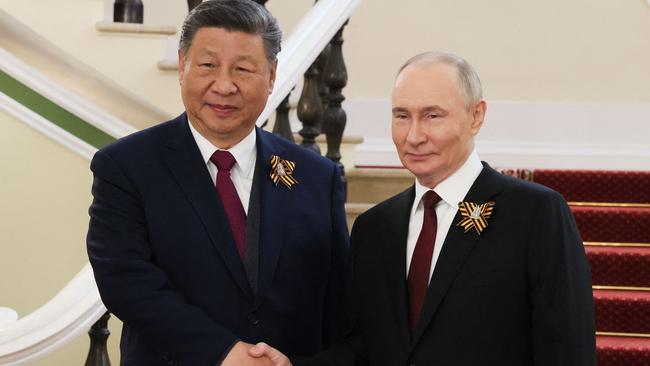
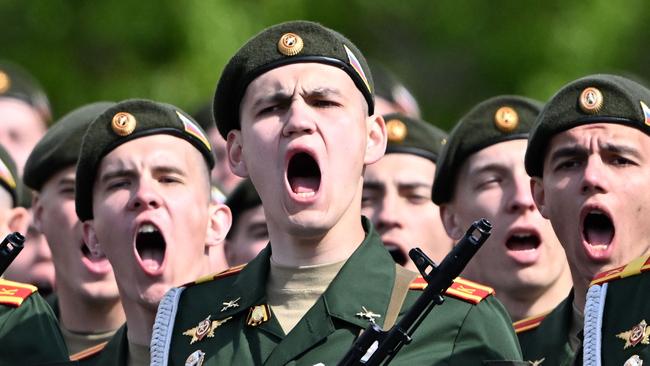
It’s a message being deafened by Russia’s ongoing armed assault against Ukraine.
And one masked by China’s island fortresses and fleet elbowing their way to dominance over the East and South China Seas.
But the pair have once again joined forces to dictate on the global stage that they’re simply misunderstood.
And here’s what they said.
“Facing the changes in the world, the changes of the times, and the changes in history, China and Russia must firmly grasp the forward direction of bilateral relations and the general trend of human society’s development, step forward courageously, collaborate comprehensively, and make new and greater contributions to promoting the development and revitalisation of both countries and maintaining international fairness and justice.”
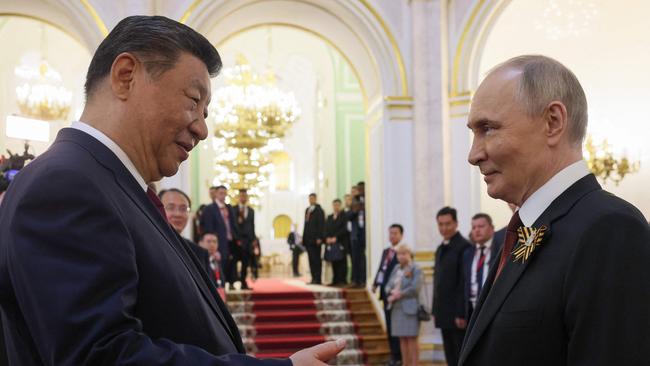

‘Friends of steel’
In 2022, Chairman Xi told President Putin during a flying visit to Beijing that the pair were “friends without limits”. Two days later, Russia invaded Ukraine.
Now Xi has proclaimed the two nations to be “true friends of steel that have been through a hundred trials by fire”. He promised the 27 other world leaders at the parade that Moscow and Beijing would stand together to counter global “unilateralism and bullying”.
Putin’s Russia is under heavy international sanctions for its unprovoked war of aggression against Ukraine.
Xi’s China is also under pressure, being the primary target of US President Donald Trump’s global tariff campaign.
That has created the strategic necessity for the two powers to strengthen their ties, argues Centre for Asia Policy Studies analyst Patricia Kim.
Trade between Beijing and Moscow has soared more than 66 per cent since the invasion of Ukraine began in 2021. That’s set to grow further, with Xi and Putin expected to sign several agreements this week. This includes establishing a new gas pipeline link from Siberia to deliver about 50 billion cubic meters of gas annually.
“As competition with the United States intensifies, Beijing views Moscow as an essential, if risky, partner,” Kim writes for the Brookings Institution.
“Still, Xi isn’t inclined to make new concessions to Putin. Russia’s economy is faltering, its military is overstretched, and its diplomatic leverage with the West remains limited. China continues to dominate the economic relationship, and that imbalance isn’t likely to change soon — though it’s increasingly a source of the Kremlin’s resentment.”

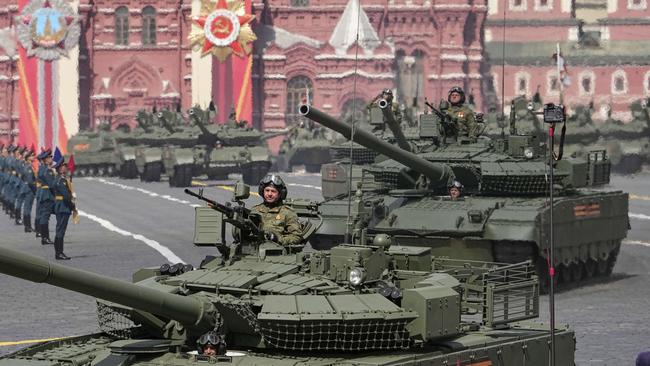
The two leaders have issued several joint and individual statements since getting together on Friday.
For the most part, the messaging has been strictly co-ordinated.
But the world has been left no doubt about who wears the pants in this relationship.
“I am willing to maintain close contact with President Putin, to steer and guide China-Russia relations, and to make a positive contribution to promoting global governance,” Chairman Xi asserted Friday.
President Putin was more demure.
“I am willing to maintain close strategic communication with President Xi Jinping to provide strategic guidance for the development of bilateral relations, jointly respond to the challenges of complex international situations, deepen comprehensive strategic co-operation, (and) safeguard the common interests of the two countries …”
Eliminating alliances
“Xi Jinping pointed out that the world has entered a new period of turbulence and transformation,” President Putin says in the joint statement. “As long as China and Russia maintain strategic determination and strategic co-operation, then no force can stop the two countries from achieving their respective development and rejuvenation …”
This vision of a shared future has been reinforced with a freshly reconstructed view of the past.
“China and Russia, as main theatres of Asia and Europe in WWII, have made decisive contributions to the victory of the World Anti-Fascist War and laid a solid foundation for the establishment of the post-war international order,” Xi proclaimed.
The Allies (of which Republican China and Soviet Russia were a part) didn’t get a mention.
Nor were they represented at the Red Square parade – on the ground or in the VIP pews.
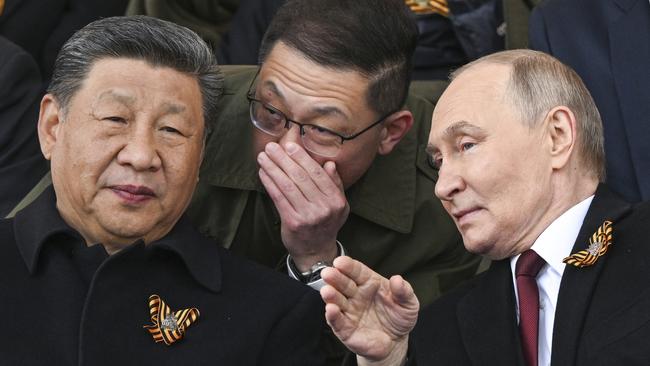
However, the lack of mention of the WWII Allied forces has an interesting counterpoint.
The Xi-Putin joint declaration took aim at the growing alignment of nations against them.
“Both sides point out that one of the strategic risks urgently needing elimination is the expansion of military alliances by certain nuclear-weapon states in sensitive regions surrounding other nuclear-weapon states,” it reads. This non-China-Russia bloc is “exerting military pressure or implementing hostile actions that threaten the fundamental security interests of other countries”.
Such alliances include the strengthening of ties between India, Australia and Japan. Not to mention growing international support for the Philippines and Taiwan.
And allies, while not directly involved in the fighting, have supplied Ukraine with financial aid, ammunition, training and equipment.
And that’s an affront to Putin.

‘Trials by fire’
Putin insists Ukraine is the successor to Nazi Germany. That’s despite President Volodymyr Zelenskyy being a Jew …
“Despite an almost complete lack of evidence to support these absurd and obscene claims, the “Nazi Ukraine” narrative continues to resonate among a Russia population that has been utterly saturated in an extreme form of World War II mythology that often borders on religious fanaticism,” says Atlantic Council analyst Peter Dickinson.
Putin has spent the past two decades embedding the Soviet Union’s World War II struggle at the heart of Russia’s national identity. It seeks to embed the notion of ultimate triumph following intense hardship.
“It has proved a highly effective strategy, helping to rebuild Russia’s battered national pride and giving new meaning to the country’s twentieth-century totalitarian trauma,” Dickinson adds.
It’s a glorified, nationalistic reinterpretation of history closely followed by China.
Chairman Xi is resolute in restoring China’s pride after “a century of humiliation”,
“The country endured intense humiliation, the people were subjected to great pain, and the Chinese civilisation was plunged into darkness,” he said at the 100th anniversary of the founding of the Chinese Communist Party in 2021. “Since that time, national rejuvenation has been the greatest dream of the Chinese people and the Chinese nation.”
In September, Putin will return the favour by visiting Beijing to celebrate its victory over Japan.
Jamie Seidel is a freelance writer | @jamieseidel.bsky.social
Originally published as Vladimir Putin and Xi Jinping stand side-by-side and proclaim new world order





